By the Book
Undergraduates explore print history at the Folger Shakespeare Library.
By Jaime Ciavarra
Photos by Julie Ainsworth
Marissa Rohrbach pushes aside her laptop and iPod while she journeys to 16th-century France.
Carefully, slowly, the GW senior cradles a 1575 edition of Discours Merveilleux in a block of foam and opens the book’s brown binding, using strings of tiny weights to hold down the crisp pages.
Rohrbach, a French literature major, is exploring the political propaganda against Catherine de Medici that spews from the black print of this early modern text. For some, it would be a complex subject to tackle, especially without access to original works. But Rohrbach can touch the faded pages, smell the musty scent of the leather cover, and trace with her eyes the handwritten marginal notes of previous owners.
Forget the digital age; Rohrbach—and seven other GW undergraduates with access to the prestigious Folger Shakespeare Library—are reaching directly into the past.
In an extraordinary seminar that started last fall, The George Washington University and the Folger Shakespeare Library, one of the world’s premier independent research institutions, are offering a book history course exclusively for GW undergraduates.
The semester-long class is an unprecedented opportunity for senior humanities majors interested in early modern or medieval studies to work with the library’s centuries-old texts—a right normally reserved only for graduate or post-doctoral researchers.
During weekly, three-hour classes, students study with a Folger scholar to learn how early books were made, the role they played in shaping culture, and how the medium of print and its reproduction shape a text’s meaning. Part of the course focuses on properly handling the fragile books; unlike other undergraduate book history classes that must use photos or digital reproductions, this course allows GW students to get up-close and personal with texts. They can touch the holes left by bookworms, finger the leaves of faded paper, and study the fonts and illustrations that make the books unique. The seminar, say students and professors alike, is an unparalleled opportunity for scholarship and discovery.
“It’s really one of a kind. There is no other university in the United States or anywhere in the world that can offer this because no other university has that connection to the Folger,” says professor Jeffrey Cohen, chairman of GW’s English department and the seminar’s University coordinator. “We want the students to be challenged, we want them to grow, and we want them to appreciate that they have something very few people have the chance to experience.”
Outside of the organized class, the students have readership rights at the Folger for the full academic year. With their own library cards, they can access the vast collection of more than 256,000 books, 60,000 manuscripts, and 250,000 playbills at the building on Capitol Hill. For some, such as Rohrbach and seniors Chris Pugh and Phil Getz, the privilege allowed them to pursue original research, which they presented to Folger staff and GW’s Board of Trustees last spring.
GW and the Folger have had a long, thriving relationship. The University was a charter member of the library’s advanced study center, the Folger Institute, when it started in 1970, and GW today is one of more than 40 colleges and universities in the world involved in the consortium. For the past decade, the University also has helped finance the Folger publication and scholarly journal Shakespeare Quarterly. Many of the University’s professors have tapped into the library’s wealth of materials while creating connections: Gail Kern Paster, an English professor at GW for nearly 30 years, became the Folger Shakespeare Library’s director in 2002.
To help celebrate the Folger’s 75th anniversary in fall 2007, Dr. Paster says library staff wanted to focus on more educational outreach. The Folger had programs for elementary, middle, and high school students, teachers, and graduate researchers—but nothing for undergraduate college students.
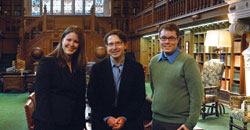
GW professor Jeffrey Cohen (center) and GW seniors Marissa Rohrbach and Chris Pugh in the Folger Shakespeare Library’s Old Reading Room. The undergraduate book history seminar is open exclusively to GW students and allows them to use the library’s remarkable resources.
“We could see what was obviously missing,” she says. Dr. Paster turned to the university and the students she knew best. She coordinated the seminar with then-Columbian College of Arts and Sciences Dean William Frawley and today continues to work with Dean Peg Barratt. GW and the Folger have agreed to continue funding the seminar through 2013. Dr. Paster, who taught Shakespeare and the history of drama at GW, says the course’s emphasis on original texts has made it particularly meaningful to students of an online era.
“I think it’s a greater challenge in the humanities to introduce students to the excitement of archival research,” Dr. Paster says. But the seminar “has fostered love of the book as a historical object. That’s part and parcel of our mission as a library, especially in the technology age.”
Treasures in the Tome
Under the soft glow of the lamplight, GW senior Chris Pugh studies the subtleties that set apart an 1898 edition of Edmund Spenser’s The Faerie Queene. He stops at an illustration of the female knight Britomart before pulling the book closer for a more intimate gaze. Pugh is analyzing how the epic Renaissance poem became translated into images, and he has used several of the Folger’s editions—including copies from 1590 and 1609—to construct his research. In the Folger’s Old Reading Room, surrounded by brimming bookshelves, dark wooden reading tables, and a stained glass window reflecting Shakespeare’s Seven Ages of Man, Pugh blends into the background as if he has been handling the materials for years.
“At first, I was frightened to even touch anything. I was working with a book so old that the covers were falling off, the pages were loosely bound, and I didn’t want to somehow ruin it,” Pugh says. “But when I got used to it, it was amazing. I’d easily spend three or four hours on a book—once I’d open it, I’d just get lost.”
In his reading, Pugh found handwritten cantos on the back cover of one volume, and he traced four previous owners of another book through the Folger’s records. Book history, the topic the class studies for 15 weeks, is centered on these types of nuances. By handling the old texts, the class learns to look at traces of their use—annotations on the end papers and margins, the way the pages and covers were bound, the collections of which they were a part—to provide a window into early culture. The physical aspects reveal what readers learned and how they used their knowledge—information that cannot be found in facsimiles or modern editions, experts say.
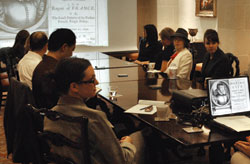
Library staff and several GW faculty members attended a May colloquium at the Folger to watch Marissa Rohrbach (pictured here) and Chris Pugh present their original research.
“Book history is kind of like ‘media literacy’ extended back in time over centuries—it helps a student to understand that there is a commercial and cultural context for the book in her hand, just as it does to know those things about a television show or a podcast,” says Leslie Howsam, a professor at the University of Windsor and vice president of the Society for the History of Authorship, Reading & Publishing, an international association that promotes the study of book history. “Authors are not solely responsible for their own books; the publishers and printers and bookbinders and other tradespeople had a hand in making the book what it became. It’s important research to pursue because it lets us think about writing from the perspective of the people who first read it, which is often radically different from our own experience. Books are deceptive in that they seem to stay the same, while actually changing very dramatically.”
The seminar, led by the Folger’s Undergraduate Program Director and Shakespeare scholar Sarah Werner, explores book history through readings and lectures on font, presses, paper, watermarks, printing, selling, editing, and authors. The students learn how to use bibliographic evidence to date materials and practice by looking at everything from 15th-century Bibles to 17th-century editions of William Lily’s Latin Grammar. Dr. Werner has the class delve into their own topics, as well. The English, French, music, and history majors choose books of interest and speculate about the text’s authorship and its contribution to culture at the time.
During the inaugural seminar, Dr. Werner says she saw a curious shift in the way the undergraduates went about their work:
“Undergraduates have such a sense of discovery. Many of the other researchers who come into the library already have a topic and an area of research—they know what they’ll be writing their dissertation on and that’s great. We offer a huge depth of information on that,” Dr. Werner says. “But with the undergraduates, I was struck by the sort-of serendipity of scholarship. They would just stumble across something, and it would open up a whole new world that it often doesn’t for scholars who are further along on their path.”
For undergrads, “There’s a value to the knowledge in and of itself,” she adds, “because it’s fun.”
New Chapters Ahead
It’s a warm spring afternoon in Washington and students study in the sunshine at GW’s Kogan Plaza. Final exams are around the corner, but Pugh and Rohrbach leave their piles of work briefly to present original book research to a scholarly audience: the Folger Shakespeare Library staff and other GW faculty members.
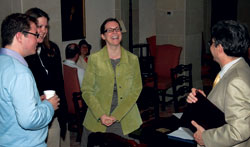
Folger scholar Sarah Werner (in green jacket) talks with Chris Pugh, Marissa Rohrbach, and Paul Duff, GW’s associate dean for undergraduate studies and professor of religion, after the presentations.
In a conference room at the library, Pugh and Rohrbach take about 20 minutes each to explain their findings and showcase notable text pages on PowerPoint slides. Rohrbach examines three different copies of Discours Merveilleux, including two written in English, and exposes the anti-foreigner sentiment surrounding Queen Catherine de Medici in late 16th century France. Pugh, an English major, highlights illustrations in several editions of The Fairie Queene to show the villainous construction of female characters in the books’ images. The students answer questions, chat with the audience members, and wrap up presentations they perfected all spring. Waiting for them, back in the library, are other books they’ve reserved for such an occasion—books that have nothing to do with their research topic but that call to their curiosity.
“Finally I’m going to have time to get to things that I’m just interested in looking at,” Rohrbach says.
For these GW students, the seminar and research opportunity gave them the confidence and know-how to indulge their academic and individual interests. Participants of the inaugural seminar have since graduated from the University, but their passion for discovery, of course, is just beginning. Rorhbach entered Yale Divinity School in August, and Pugh has been inspired to study book history at the University of Toronto this year. Phil Getz, a history major in the seminar who analyzed the text and paratext of a Latin translation of Maimonides’ “Laws of Repentance”, says the course has helped him develop academically as well as professionally.
“Doing this type of research as an undergrad, getting this type of exposure, gives you the investigative research skills you need for anything, whether you’re going to be a lawyer, a scientist, whatever. I’ve already had to learn how to use primary and secondary sources in a very serious and analytical way. It prepares you to constantly ask the next question,” Getz says.
This fall, other GW humanities undergraduates have transitioned into the open positions. Seven students have begun their studies at the Folger, including history, English, and French majors. Dr. Werner and Dr. Cohen are expecting to keep the class small and competitive, with between eight and 12 students. Jointly funded by the University and the Folger, the seminar will continue to be a one-of-a-kind capstone for at least the next five years. The English department, Dr. Cohen adds, has long had deep research strengths in the early modern period, and now the seminar has become a bridge for making high-level resources accessible and meaningful for a new generation of students. Dr. Cohen says it gives GW humanities undergraduates an edge:
“Even for students who don’t go on to anything that’s related to early modern or medieval studies, I hope that they look back on this and see that it was a once-in-a -lifetime opportunity,” Dr. Cohen says. “I think it has opened a door for them.”
The door, Pugh and Rohrbach say, leads to the library—and to the unparalleled power of the open book.

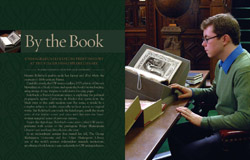
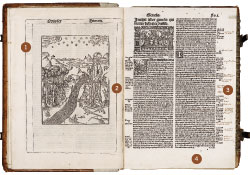 The Folger and GW undergraduate seminar focuses on the history of books in this medieval to early modern time period. Pictured here is an example from the class: A close-up look at a 1527 printing of the Vulgate Bible, the official Latin translation of the Bible, with detailed descriptions provided by Folger scholar and class leader Sarah Werner.
The Folger and GW undergraduate seminar focuses on the history of books in this medieval to early modern time period. Pictured here is an example from the class: A close-up look at a 1527 printing of the Vulgate Bible, the official Latin translation of the Bible, with detailed descriptions provided by Folger scholar and class leader Sarah Werner.